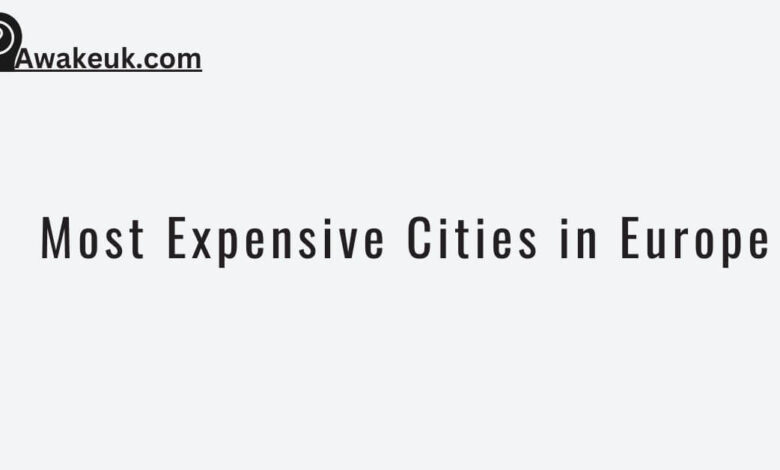Most Expensive Cities in Europe in 2024

Many ex-pats and vacationers consider Europe to be an ideal location. What is there not to like? Rich history, rich culture, delectable cuisine… Nobody said it would be inexpensive; everything has a price.
With the Ukraine conflict, supply disruptions, and increased energy prices, 2024 will be challenging. As a result, there is a significant cost of living crisis.
While Hong Kong remains the most expensive city in the world for ex-pats and holidaymakers, Zurich is the winner in Europe. Switzerland, in fact, wins the luxurious award with four cities ranking among the top five most expensive cities in Europe!
The ten most expensive cities in Europe, according to Expatistan’s cost of living index as of October 2022, are shown below. We’ve also included a section on living expenses based on Numbeo data.
The local currencies have been converted to Euro.
Introduction:
In the ever-changing landscape of global economics, the cost of living in different cities across Europe can fluctuate dramatically from year to year. As we look ahead to 2024, it’s essential to stay informed about the most expensive cities on the continent. This article will delve into the factors contributing to the high costs of living in certain European cities and explore the top contenders for the title of “Most Expensive Cities in Europe in 2024.”
Understanding the Metrics:
Cost of Living Index
To find out which places are the most expensive, we must first understand what the cost of living index is. This index looks at a number of things, like the cost of housing, transportation, food, and activities. The index shows how much it costs to live in a place. The higher the score, the more it costs to live there.
Exchange Rates
Exchange rates are a very important part of figuring out how affordable a place is. Changes in currency exchange rates can raise or lower the cost of living for both people who live there and people who move there.
Inflation Rates
The cost of living in a place can be very affected by the rate of inflation. Higher inflation causes costs for goods and services to go up, making it more expensive for both people who live there and people who come to visit.
Local Income Levels
When we compare the cost of living to the average income in a place, we can see how affordable it is for the people who live there. When living costs are high and wages are low, it can be hard to make ends meet.
1. Zurich, Switzerland:
Switzerland, as you are surely aware, is one of the most expensive countries in the world, with Zurich being the most expensive city in Europe.
Zurich is a popular destination on a European tour due to its rich history and numerous museums, as well as its central location in Europe and proximity to the famous Swiss Alps. This experience, though, may come at a high cost.
Zurich does have a reputation for being pricey. This is true for both regular living expenses and real estate. Fortunately, the net pay is among the highest in the world, and there are lots of positions for foreigners.
Prices, as in other financial areas, might vary greatly depending on where you live. This is especially true for real estate, which can be difficult for digital nomads and expats to navigate.
Cost of Living
Accommodation
- €1,952 for a one-bedroom apartment in the city center
- €1,525 for a one-bedroom apartment outside of the city core.
Restaurants
- McDonald’s McMeal costs €15.47.
- Meal, Low-Cost Restaurant price: €25.79
- Cappuccino costs €5.39.
- Beer: €7.22
Markets
- Milk (1 liter): €1.74
- Loaf of Fresh White Bread (500g): €3.10
- Eggs (12): €5.71
- Banana (1kg): €2.89
Utilities (Monthly)
- Electricity, heating, cooling, water, and garbage: €246
- €50 for internet
2. Geneva, Switzerland:
Geneva, the second-largest city in Switzerland, is an important financial and diplomatic center.
Living in Geneva is opulent in every sense of the word. Its level of living is among the highest in Europe, but it is also among the most expensive. Geneva is considered exceedingly pricey even by Swiss standards for foreigners living in Switzerland. Living expenses in Geneva may be greater than in your native country. To save money for the move, it is best to buy needs in your home country.
However, Geneva is a lovely city with a lot to offer and many foreigners opt to reside there. It is located at the southern end of “Lake Geneva” and has many stunning scenery. Despite its high cost of living, the city provides a high standard of living.
Cost of Living
Accommodation
- €2,100 for a one-bedroom apartment in the city core.
- €1,750 for a one-bedroom apartment outside of the city core.
Restaurants
- McDonald’s McMeal: €15 Meal, Low-Cost €26 for a meal at a restaurant
- €4.61 for a cappuccino, €8 for a beer
Markets
- Milk (1 liter): €1.60
- Loaf of Fresh White Bread (500g): €2.67
- Eggs (12): €5.46
- Banana (1kg): €2.61
Utilities (Monthly)
- Basic (Electricity, Heating, Cooling, Water, Garbage): €188
- Internet: €55
3. London, UK:
London is one of the most expensive cities in Europe. The English capital has a reputation for being an extraordinarily costly city. It’s safe to say that the Big Smoke lives up to its name. With one of the world’s most valuable currencies, the pound sterling $, the country of Big Ben does actually have a higher cost of living, even for people earning Euros or US dollars.
Due to extremely high rent prices, London is the most expensive city in the UK to live in, yet comparatively high salaries help to counteract this. Greater London has the highest average rent in the United Kingdom.
London is a costly city, but you get good value because practically everything you might want is right outside your door. And the general standard of living is superb. Few cities can match London’s artistic, cultural, sports, culinary, and social scenes.
Cost of Living
Accommodation
- €2,150 for a one-bedroom apartment in the city core.
- €1,565 for a one-bedroom apartment outside of the city core.
Restaurants
- McMeal at McDonald’s: €7.99
- Meal, Inexpensive Restaurant: €18.27
- Cappuccino: €3.71
- Beer: €6.85
Markets
- Milk (1 liter): €1.26
- Loaf of Fresh White Bread (500g): €1.24
- Eggs (12): €2.73
- Banana (1kg): €1.48
Utilities (Monthly)
- Basic (Electricity, Heating, Cooling, Water, Garbage): €283
- Internet: €34
4. Lausanne, Switzerland:
Lausanne, located in French Switzerland, is a typical Swiss city, full of absolute elegance and a high quality of life. However, it is true that it is one of Europe’s most costly cities to live in.
Despite its tiny size, there are numerous opportunities for digital nomads in the city. Lausanne has a wealth of knowledge as well as a range of activities and cultural events that you should plan on attending. You will certainly fall in love with Lausanne since there is always something to do, whether it’s strolling and admiring the stunning vistas or dining and dancing at one of the many local events.
Lausanne is well-known for its Olympic headquarters and for being a student city. The area boasts popular ski resorts, is surrounded by mountains, and has a magnificent lake, the Leman, where residents enjoy windsurfing and water skiing.
Cost of Living
Accommodation
- €1,610 for a one-bedroom apartment in the city center
- €1,328 for a one-bedroom apartment outside of the city core.
Restaurants
- McMeal at McDonald’s: €15.47
- Meal, Inexpensive Restaurant: €25.79
- Cappuccino: €5.08
- Beer: €8.25
Markets
- Milk (1 liter): €1.72
- Loaf of Fresh White Bread (500g): €2.94
- Eggs (12): €6.54
- Banana (1kg): €2.63
Utilities (Monthly)
- Basic (Electricity, Heating, Cooling, Water, Garbage): €296
- Internet: €56
5. Basel, Switzerland:
Basel, located on the northern and western borders of Switzerland, as well as the southern Black Forest of Germany and Alsace, offers exceptional shopping, cultural, and leisure options. As a result, Basel provides a distinct style of life throughout Switzerland.
If you reside in Basel, nothing is more than a few steps away…There are parks and playgrounds, as well as museums, restaurants, and nightclubs. There are stunning modern homes and workplaces, as well as a medieval town center and historic neighborhoods from the nineteenth century.
Basel is a green city where you may enjoy sports, games, and entertainment all year long in small neighborhood oases and city parks. But everything has a cost, and this lovely city is one of the most costly in Europe to live in.
Cost of Living
Accommodation
- €1,326 for a one-bedroom apartment in the city center
- €1,150 for a one-bedroom apartment outside of the city core.
Restaurants
- McMeal at McDonald’s: €16.53
- Meal, Inexpensive Restaurant: €25.82
- Cappuccino: €5.34
- Beer: €7.75
Markets
- Milk (1 liter): €1.70
- Loaf of Fresh White Bread (500g): €3.26
- Eggs (12): €5.79
- Banana (1kg): €2.62
Utilities (Monthly)
- Basic (Electricity, Heating, Cooling, Water, Garbage): €277
- Internet: €52
6. Dublin, Ireland
In October 2022, Dublin remains the sixth most expensive city in Europe. Dublin is well-known for its vibrant nightlife and proximity to Ireland’s breathtaking natural settings. However, it is one of Europe’s most costly cities, owing partly to the huge population of ex-pats and hence exorbitant rents.
However, there are other reasons why you might consider relocating to Dublin. The city provides all of the advantages of city living while keeping a relaxed atmosphere. The rushing that is common in other capital cities will not occur here.
The mountains and seashore of Dublin’s area offer a quick escape to nature. Many hiking trails and bathing sites are accessible through public transportation, providing a respite from the hustle and bustle of daily life.
Cost of Living
Accommodation
- €1,653 for a one-bedroom apartment in the city center
- €1,458 for a one-bedroom apartment outside of the city center
Restaurants
- McMeal at McDonald’s: €9.50
- Meal, Inexpensive Restaurant: €18
- Cappuccino: €3.55
- Beer: €6
Markets
- Milk (1 liter): €1.15
- Loaf of Fresh White Bread (500g): €1.66
- Eggs (12): €3.10
- Banana (1kg): €1.76
Utilities (Monthly)
- Basic (Electricity, Heating, Cooling, Water, Garbage): €145
- Internet: €51
7. Copenhagen, Denmark:
For many years, Denmark’s capital has been a famous tourist destination. However, for budget-conscious digital nomads, Copenhagen is usually a short trip. Denmark is one of the countries with a high standard of living; as a result, the cost of living is very expensive.
Nonetheless, this dynamic Nordic city has a substantial immigrant community and is a creative and inventive magnet. For many digital nomads and ex-pat foreigners, it makes perfect sense to try their luck in Copenhagen; it’s a fantastic place to live a satisfying life.
Cost of Living
Accommodation
- €1,483 for a one-bedroom apartment in the city center
- €1,111 for a one-bedroom apartment outside of the city core.
Restaurants
- McMeal at McDonald’s: €11.09
- Meal, Inexpensive Restaurant: €18.83
- Cappuccino: €5.71
- Beer: €6.72
Markets
- Milk (regular), (1 liter): €1.67
- Loaf of Fresh White Bread (500g): €2.90
- Eggs (regular) (12): €3.97
- Banana (1kg): €2.56
Utilities (Monthly)
- Basic (Electricity, Heating, Cooling, Water, Garbage): €188
- Internet: €34
8. Oslo, Norway:
Oslo is regarded for its extraordinarily excellent quality of life, consistently ranking first among European cities. However, in general, a good quality of life comes with a great expense. There is no exception in Oslo.
In October 2022, the city ranked sixth on the list of most expensive cities in Europe.
But here’s the thing: Oslo is Norway’s most multicultural city. It is also one of the fastest-growing capital cities in Europe. Fjords, woodlands, and archipelagos… Norway is unquestionably one of the most beautiful countries on the planet.
Cost of Living
Accommodation
- €1,387 for a one-bedroom apartment in the city center
- €1,103 for a one-bedroom apartment outside of the city core.
Restaurants
- McMeal at McDonald’s: €11.13
- Meal, Inexpensive Restaurant: €19
- Cappuccino: €4.39
- Beer: €9
Markets
- Milk (regular), (1 liter): €1.88
- Loaf of Fresh White Bread (500g): €2.75
- Eggs (12): €3.82
- Banana (1kg): €2.12
Utilities (Monthly)
- Basic (Electricity, Heating, Cooling, Water, Garbage): €219
- Internet: €46
9. Amsterdam, The Netherlands:
The Netherlands is another country that has earned a reputation for having a high standard of living, but this comes at a cost. According to the 2022 index, Amsterdam, the capital city, is the ninth most expensive city in Europe.
However, this does not appear to deter vacationers and ex-pats from flocking to this attractive city in large numbers throughout the year. Cultural events like art expositions, concerts, and other acts catering to a wide range of preferences abound in the city.
Although living in the Dutch capital is not as expensive as in the Nordic capitals, expect to spend a large amount of your monthly income on housing. This is particularly true if you select a completely equipped residence.
Cost of Living
Accommodation
- €1,671 for a one-bedroom apartment in the city center
- €1,423 for a one-bedroom apartment outside of the city center
Restaurants
- McMeal at McDonald’s: €10
- Meal, Inexpensive Restaurant: €18
- Cappuccino: €3.47
- Beer: €5.50
Markets
- Milk (regular), (1 liter): €1.15
- Loaf of Fresh White Bread (500g): €1.66
- Eggs (regular) (12): €3.06
- Banana (1kg): €1.63
Utilities (Monthly)
- Basic (Electricity, Heating, Cooling, Water, Garbage): €228
- Internet: €46
10. Trondheim, Norway:
Trondheim is the third-largest city in Norway. It was previously the country’s capital and is considered Norway’s most historic city. It’s a university town filled with pubs and young people. Aside from the numerous historical landmarks to see, individuals who know Trondheim say there is no shortage of excitement.
This city has it all: history, architecture, fantastic restaurants, beautiful green spaces, lively nightlife, and a myriad of student organizations.
However, even with numerous discounts, public transportation is very expensive, so the simplest way to save money is to invest in a bicycle. Fortunately, because the city is so small, everything in the city center is within walking distance, so you’ll be able to save a lot of money on transportation.
Cost of Living
Accommodation
- €1,157 for a one-bedroom apartment in the city center
- €910 for a one-bedroom apartment outside of the city core.
Restaurants
- McMeal at McDonald’s: €10.63
- Meal, Inexpensive Restaurant: €19.73
- Cappuccino: €4.19
- Beer: €9
Markets
- Milk (regular), (1 liter): €1.98
- Loaf of Fresh White Bread (500g): €3
- Eggs (regular) (12): €4.28
- Banana (1kg): €2.30
Utilities (Monthly)
- Basic (Electricity, Heating, Cooling, Water, Garbage): €132
- Internet: €47
That concludes the list of Europe’s most costly cities. However, don’t let this ranking discourage you from visiting the continent. Europe is vast, with several cities catering to a variety of budgets.
Methodology:
- Expatistan provides a value of 100 to a central reference city, Prague, to generate the Price Index value for each city. Following the establishment of the reference point, the Price Index value of each other city in their database is determined by comparing the cost of living in that city to the cost of living in Prague.
- For example, a Price Index of 134 indicates that living in that city is 34% more expensive than living in Prague.
- Please keep in mind that these data are subject to change, which is why we recommend conducting a comprehensive study when deciding to relocate to a specific place.
The price index of the costly cities in Europe highlighted in our post is shown in the chart below.
| Ranking | City | Price Index |
| 1st | Zurich (Switzerland) | 244 |
| 2nd | Geneva (Switzerland) | 243 |
| 3rd | London (United Kingdom) | 229 |
| 4th | Lausanne (Switzerland) | 229 |
| 5th | Basel (Switzerland) | 228 |
| 6th | Dublin (Ireland) | 195 |
| 7th | Copenhagen (Denmark) | 180 |
| 8th | Oslo (Norway) | 178 |
| 9th | Amsterdam (Netherlands) | 172 |
| 10th | Trondheim (Norway) | 169 |
Benefits of Most Expensive Cities in Europe:
- Job Possibilities and Economic Prosperity: The most costly European cities frequently have robust and diverse economies, with plentiful job possibilities in a variety of industries. They attract international enterprises, startups, and businesses by providing a platform for professional development and career growth.
- High Quality of Life: The high cost of living in these cities is frequently accompanied by a high quality of life. Superior healthcare, great educational facilities, efficient public transit, well-maintained infrastructure, and a diverse range of recreational and cultural activities are common among residents.
- Cultural Richness and Diversity: Expensive European towns are often cultural hotspots, with a rich history, architectural marvels, world-class museums, art galleries, theaters, music venues, and a wide range of culinary delights. Residents have access to a thriving cultural environment as well as a diverse range of entertainment alternatives.
- Education and Academic Excellence: European towns with high living costs frequently have prestigious universities and research centers. Access to top-tier educational programs can help you grow personally and professionally.
- Global Networking and Business Exposure: Because these locations attract international talent and businesses, there are numerous chances for networking, collaboration, and exposure to the global business environment. Professional development and global commercial contacts can be boosted through networking in such cities.
- Safety and Security: Safety and security are generally prioritized in Europe’s most expensive cities, resulting in lower crime rates and a sense of safety among inhabitants and visitors. A safe living environment is enhanced by well-funded public services and law enforcement.
- Health and Well-Being: Higher living costs can enable access to high-quality healthcare services, cutting-edge medical facilities, well-trained healthcare staff, and a strong emphasis on overall well-being and healthy living.
- Efficient Public Services and Infrastructure: These cities typically make significant investments in infrastructure development and public services. Efficient public transportation, well-kept roads, sophisticated public amenities, and dependable utilities all contribute to a convenient and comfortable way of life.
- Environmental Sustainability: In expensive European cities, sustainability, green initiatives, and environmental awareness are frequently prioritized. There are frequent attempts within and around the city to minimize carbon footprints, improve recycling services, and protect natural environments.
- Opportunities for Travel and Exploration: Because these cities are located in Europe, they enable easy access to a plethora of other European sites, allowing inhabitants and visitors to enjoy the continent’s unique cultures, history, and landscapes.
Conclusion:
As we look ahead to 2024, it’s clear that a number of European towns will still be some of the most expensive places to live. These high costs are caused by things like the cost of housing, changes in the currency, and the desire for luxury goods. But if people are careful with their budgets and make smart financial decisions, they can still live a full life in these exciting but expensive places.
People Also Ask:
-
What will be Europe’s most costly city?
Switzerland, Zurich
Zurich, Switzerland is number one. Switzerland, as you are surely aware, is one of the most expensive countries in the world, with Zurich being the most expensive city in Europe. -
Which European countries are the richest?
Europe is home to some of the world’s most successful countries, with over 50 countries and non-country territories, many of which have millennia of global influence.
Gross Domestic Product (GDP) is the most common fundamental measure of national wealth, representing the total value of goods and services produced by a country during a certain time period (usually a year). In 2020, the top six largest European countries had a combined GDP of more than $1 trillion (US), totaling $13.833 trillion (US). According to these figures, Europe’s financial leaders are among the most productive countries in the world.
The top 3 richest countries in Europe by total 2020 GDP are:
Germany – $3.8 trillion
United Kingdom – $2.7 trillion
France – $2.6 trillion -
What is the highest cost of living in Europe?
Thus, Ireland (146% of the EU average), Denmark (145%), and Luxembourg (137%) are the most expensive countries to live in. Poland (62%), Bulgaria (59%), and Romania (58% are the cheapest.



